Research Papers/Articles
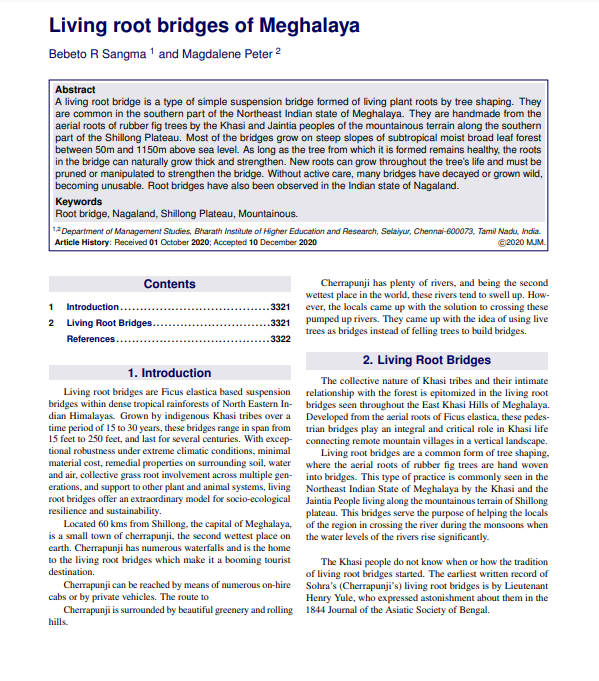
This study shows that new roots that grow throughout the tree’s life must be pruned or manipulated to strengthen the bridge. Without active care, many bridges have decayed or grown wild, becoming unusable. Root bridges have also been observed in the Indian state of Nagaland.
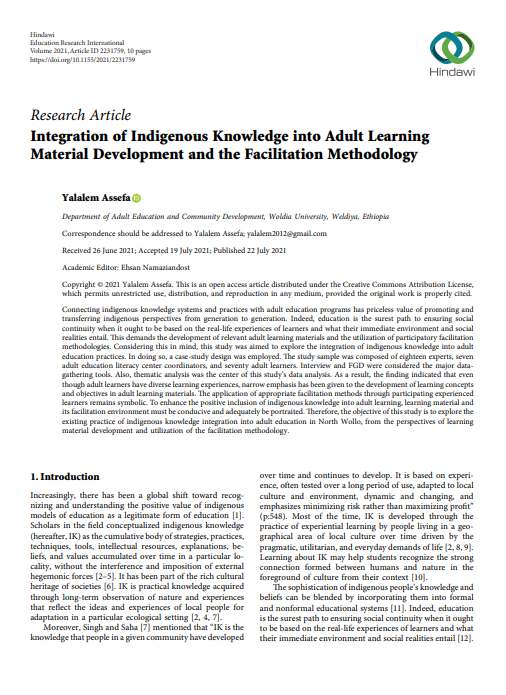
Integration of Indigenous Knowledge into Adult Learning Material Development and the Facilitation Methodology
2021
Author(s): Namaziandost E , Assefa Y
The objective of this study is to explore the existing practice of indigenous knowledge integration into adult education in North Wollo, from the perspectives of learning material development and utilization of the facilitation methodology.
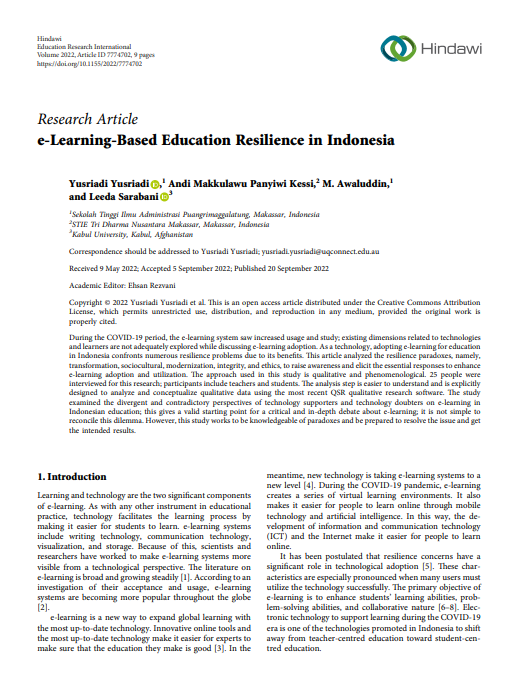
e-Learning-Based Education Resilience in Indonesia
2022
Author(s): Yusriadi Y, Kessi AMP, Awaluddin M, Sarabani L , Rezvani E
The study examined the divergent and contradictory perspectives of technology supporters and technology doubters on e-learning in Indonesian education; this gives a valid starting point for a critical and in-depth debate about e-learning; it is not simple to reconcile this dilemma.

Niyat Project: An Attempt of Boosting Food Security in Northern Argentina Through Agroecology
2023
Author(s): Slow Food
Indigenous communities continue to face marginalization and exclusion from vital resources and opportunities, leading to alarming rates of poverty and malnutrition, particularly among women and young people.

Priorities for Food and Agriculture in the Near East and North Africa Region 2020-2030
2022
Author(s): Food and Agriculture Organization of the United Nations FAO
This paper aims to identify key strategic priorities for food and agriculture in the region for the next ten years, and how FAO can best support countries in addressing these priorities in the context of the 2030 Agenda and the Sustainable Development Goals.

Agriculture Food Systems Transformation: From Strategy to Action
2021
Author(s): Food and Agriculture Organization of the United Nations FAO
This paper focuses on how FAO provides ways for better production, better nutrition, a better environment, and a better life, using a systems-based approach to tackle the complex challenges, FAO is working to accelerate innovation, technology, data, governance, and institutions to transform today’s agri-food systems for tomorrow’s world.
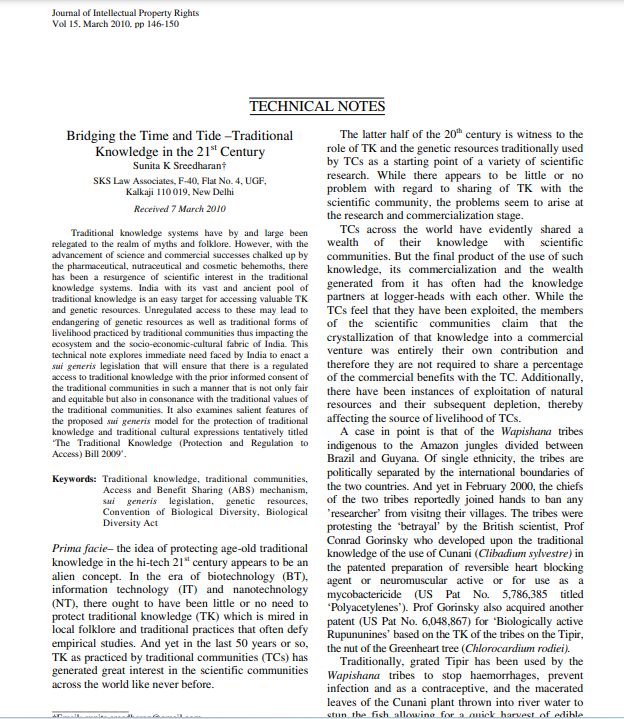
Bridging The Time and Tide –Traditional Knowledge in The 21st Century
2010
Author(s): Sreedharan SK
Traditional knowledge systems have by and large been relegated to the realm of myths and folklore. However, with the advancement of science and commercial successes chalked up by the pharmaceutical, nutraceutical and cosmetic behemoths, there has been a resurgence of scientific interest in the traditional knowledge systems.
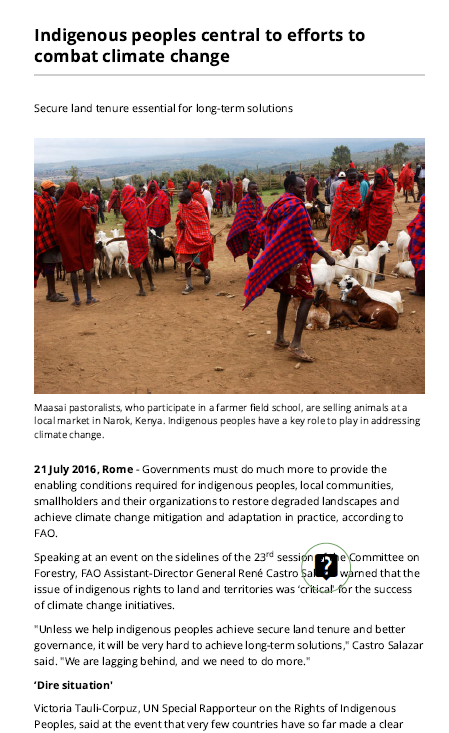
Indigenous Peoples Central to Efforts to Combat Climate Change
2016
Author(s): Food and Agriculture Organization of the United Nations
Governments must do much more to provide the enabling conditions required for indigenous peoples, local communities, smallholders and their organizations to restore degraded landscapes and achieve climate change mitigation and adaptation in practice, according to FAO.

Indigenous Women Entrepreneurs in Papua GET Ahead
2011
Author(s): International Labour Organization
Like many other women who live in a patriarchal society, the indigenous women of Papua do not have many opportunities to take part in the development process. Their traditionally low status in the tribal hierarchy and poor education make them second-class members of society who have to occupy themselves with food and children, and serve their husbands.
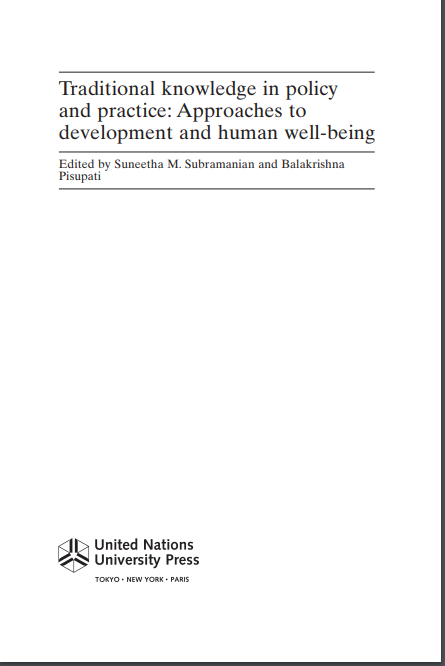
Traditional Knowledge in Policy and Practice: Approaches to Development and Human Well-being
2010
Author(s): Subramanian SM , Pisupati B
The contribution of indigenous and local communities to sustainable development is not limited to their role as natural resource managers. Local knowledge is increasingly being used to produce marketable commodities and as the basis for eco and cultural tourism. These communities have realized that their unique biological and cultural diversity is a marketable product in the modern world, and a sound basis for community entrepreneurialism.



